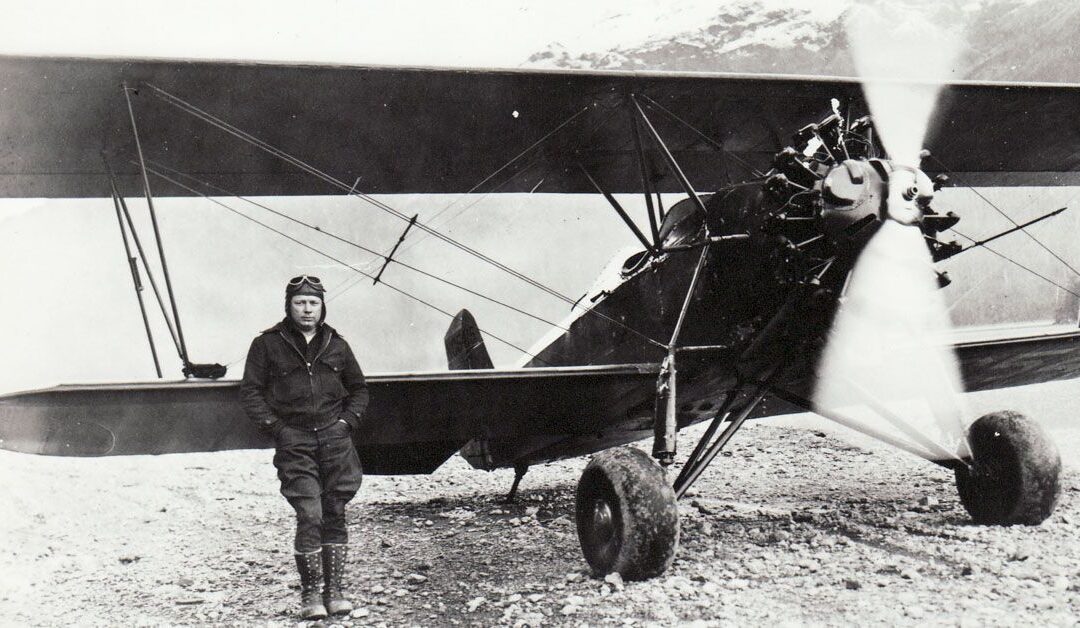Last Frontier Tales
By Hank Nuwer
When a short list of 20th Century Alaskan legends is discussed, chances are Merle K. “Mudhole” Smith is somewhere up at the top of the heap.
After all, the one-time barnstormer and bush pilot served as president of Cordova Air Service in 1939 and held that post until merging with Alaska Airlines in 1978. Later he served as a director and vice president of Alaska Airlines.
And in 1988, seven years after his death, a bronze plaque was unveiled announcing the name change of the Cordova airport to “Cordova Merle K. `Mudhole’ Smith Airport.”
But in 1946, Smith was a citizen of Cordova intent on helping his fellow townspeople facing near-starvation as a Maritime Strike on the West Coast put an end to all but one shipment of food and supplies to Alaska.
Food supplies elsewhere were also sorely needed.
Following the bombings, fires and overall destruction of World War Two, food shortages also were rampant in Europe.
My German-speaking father and several fellow soldiers had been among the 40,000 troops occupying Austria immediately following Germany’s surrender. They bunked in her home for several months until discharged.
The woman of the house wrote letters in German to my paternal grandmother beginning shortly after their occupation. Her first or second letter said that my father and his comrades were more like brothers than soldiers.
After my father returned to her family farm and married a neighbor farm girl, my mother, Grandma Magdalena Nuwer learned of the food shortages in Austria.
She regularly sent food packages of canned hams and other meats to this woman’s family in Austria.
Unfortunately, in Cordova, an occasional can of ham wouldn’t help much.
Lower 48 newspapers on November 9, 1946, announced the closer of both Cordova food stores. Shelves stayed bare that once held flour, sugar, salt, fats, oils, dried fruit, beans and rice, according to the Charlottesville, Virginia Daily Progress.
Worse, there was no food for livestock such as dairy cows.
The Nome Nugget reported that Cordova was “fighting for life” on November 25, 1946.
“It isn’t very pleasant to watch a man slowly strangle to death,” wrote a Nugget writer. “It is far worse to watch an entire town gasping for life . . .”
Confronted with the facts, the strikers at that time agreed to allow 1,000 tons of food for livestock and other supplies to go through on the relief ship Grommet Reefer out of Seattle. The U.S. Navy also sent some food supplies.
And Canadian officials allowed an Alaska trucking service to bring 14,000 pounds of meat tax-free on the U.S.-built Alaskan Highway.
But throughout the food drought, Merle Smith’s Cordova Air Service saved the town from total calamity, the Seattle Post-Intelligencer reported.
He hauled in food despite a cost of $300 per ton.
On September 25, 1946, Cordova Airlines left Seattle with a planeload of dairy feed to save a local herd of milk cows.
The Nugget reported that a delivery of 3.5 tons of potatoes took the two stores only two hours to sell out. Purchases were limited to a single 10-pound bag.
The air-freight costs made the price of meats like ground hamburger skyrocket.
Families made do on Alaskan fresh fish and canned crab and salmon.
Appeals to President Harry S. Truman came from Alaska delegate E. L. Bartlett and Territorial Governor Ernest Gruening. They said the strike had halted all slated summer and fall shipments.
The strike had other adverse effects on Alaskans. The Cordova Times, for example, discontinued publication from late December 1946 until January 3, 1946, because its newsprint stocks were exhausted. A ship with bales of newsprint finally arrived on January 12.
The Times was one of only six daily papers in Alaska at the time. The Anchorage Times made significant page cuts.
The maritime strikes of 1946 ended through government intervention, some arbitration attempts, and eventual compromises with the striking unions. President Truman settled with American Federation of Labor (AFL) seamen after his administration tossed out a wage-cut ruling. The Committee for National Maritime unity, a cluster of CIO (Congress of Industrial Organizations) took longer than the AFL to settle.
Just when it looked like Cordova’s food drought was ending, the steamship Alaska with crew, passengers and supplies ran aground on February 3, 1947, at Orca Bay and tore a hole in its double bottom.
Until repairs could be achieved and the vessel was freed and repaired, 600 tons of cargo destined for Cordova and Valdez stayed put in the Alaska’s hold.
Over time, similar maritime strikes reminded Alaskans that they might pride themselves on being independent souls, but for food and precious materials such as building supplies they were all too dependent on shipping unions.
Hank Nuwer is an adjunct professor at the University of Alaska, Fairbanks.
